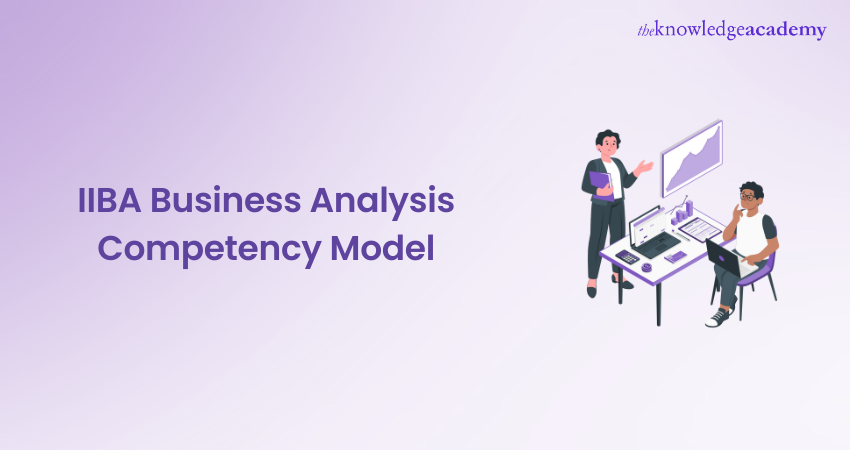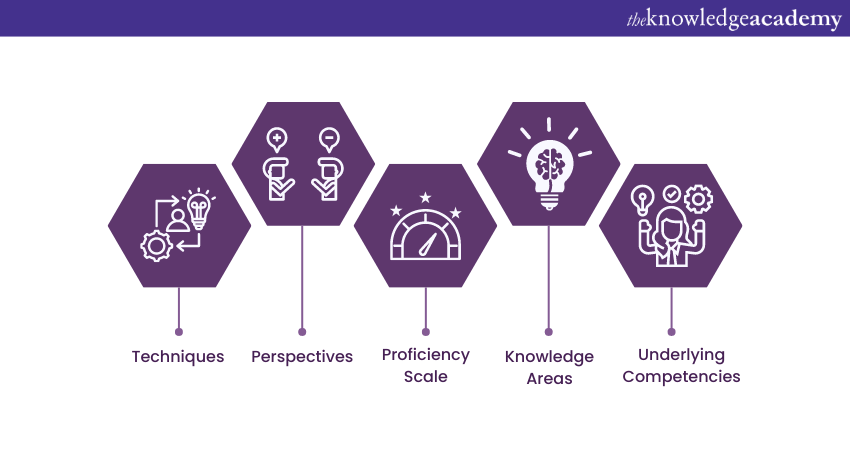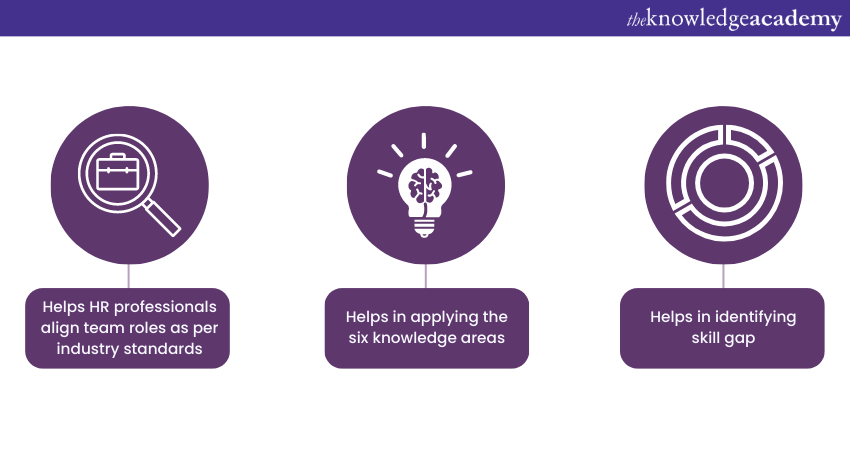We may not have the course you’re looking for. If you enquire or give us a call on 44 1344 203 999 and speak to our training experts, we may still be able to help with your training requirements.
Training Outcomes Within Your Budget!
We ensure quality, budget-alignment, and timely delivery by our expert instructors.

The IIBA Business Analysis Competency Model is a framework that outlines the essential skills, abilities, and knowledge required for individuals to excel as Business Analysts. It serves as a tool for assessing and developing professionals in order to ensure effective project execution. This model helps individuals and organisations evaluate their competency in Business Analysis and identify areas for improvement and growth.
According to a survey by the IIBA in 2018, 31 per cent of Business Analysts have an experience of six to ten years. The same survey reveals that 38 per cent of BA professionals predict Business Transformation as a viable career choice for their future. The Business Analysis Competency Model by the IIBA describes the key areas where individuals and companies can assess and develop their abilities in Business Analysis.
Table of Contents
1) Components of the IIBA Business Analysis Competency Model
a) Techniques
b) Perspectives
c) Proficiency Scale
d) Knowledge Areas
e) Underlying Competencies
2) Benefits of the IIBA Business Analysis Competency Model
3) Conclusion
Components of the IIBA Business Analysis Competency Model

The IIBA Business Analysis Competency Model was established in 2010 as an initiative to guide professionals like managers, team leads, and human resource professionals in their work. The model contains six segments which make up its framework such as:
Techniques
The Techniques segment of the competency model describes the techniques Business Analysts can utilise to perform Business Analysis tasks. These techniques are described in the BABOK blog and are designed to discuss the most practised techniques within the Business Analysis community.
Perspectives
The Perspectives segment of the competency model illustrates the different views of Business Analysis. The segment guides Business Analysts to work from multiple points of view to improve the performance of the Business Analysis tasks. Performance quality is generally enhanced after being provided with the context of the initiative.
Proficiency Scale
The Proficiency Scale helps identify behaviours and techniques associated with Business Analysis at each level. It also guides readers or BA aspirants to understand competency levels through the IIBA Business Analysis Competency Model. The scale has five points: General Awareness, Practical Knowledge, Skilled, Expert and Strategist. These points help the BA assess the level of proficiency.

Prepare for the Business Analysis Certification’s first level by signing up for the IIBA Entry Certificate in Business Analysis (ECBA) course now!
Knowledge Areas
The Knowledge Areas of the competency model contain six key areas representing Business Analysis, such as:
a) Solution Evaluation: This knowledge area describes the two tasks that BAs can perform, such as first assessing the performance and value delivered by an enterprise. Then the BA can recommend the removal of constraints preventing the complete realisation of the value.
b) Business Analysis Planning and Monitoring: This knowledge area describes the tasks that Business Analysis professionals can perform. These tasks help the organisation coordinate efforts with stakeholders.
c) Requirements Analysis and Design Definition: This knowledge area describes the tasks that Business Analysis professionals can perform to conduct elicitation activities. The confirmation of the obtained results then follows these activities. Finally, the BA must collaborate with the project stakeholders for all the Business Analysis activities.
d) Requirements Life Cycle Management: This knowledge area describes tasks that Business Analysis professionals can perform to manage and maintain requirements. The professionals can also design information from the inception stage to retirement.
e) Strategy Analysis: This knowledge area describes the work that needs to be done by Business Analysis professionals. They can collaborate with stakeholders to identify important strategic and tactical needs, helping enterprises address their business needs. The BAs can also help the enterprise align its strategies with higher and lower-level activities.
f) Elicitation and Collaboration: This knowledge area describes tasks such as structuring and organising requirements for the activities, specifying and modelling requirements, verifying information, identifying business solutions and estimating the value of each solution.
Underlying Competencies
Here is a list of competencies that describe the characteristics and personal qualities supporting the practice of Business Analysis:
Analytical Thinking and Problem-solving: Business Analysts require these skills for effectively analysing issues and opportunities. They also can identify the changes that can deliver maximum value. They collaborate with stakeholders to understand the impact of the changes. Here are the sub-categories:
a) Creative Thinking: A Business Analyst’s ability to think creatively implies that they can generate new concepts and ideas. This ability often entails paying attention to stakeholder needs from different angles and recommending new approaches.
b) Decision Making: A Business Analyst needs to have excellent skills in choosing the most valuable alternatives that will benefit the organisation’s stakeholders.
c) Learning: A Business Analyst’s career path involves continuous self-improvement and skill expansion. A constant acquisition of new knowledge and information is crucial for successful performance. More importantly, the analyst must be capable of applying their existing knowledge to currently active tasks.
d) Problem-solving: Problems are natural occurrences in all the stages of a Business Analysis process. An analyst must be capable of determining the root cause of problems and ensuring that everyone understands the problem in its entirety. Additionally, the analyst should also be able to propose a suitable solution for the issue.
e) Systems Thinking: The foundation of Systems thinking is to be well-versed in how people, processes and technology interact as one organisation. A familiarity with such systems becomes a well-rounded approach to Business Analysis. As a result, the Business Analyst understands tricky processes which need to be observed from a holistic point of view.
f) Conceptual Thinking: Conceptual thinking abilities can significantly help a Business Analyst establish links among requirements, solutions, stakeholders and changes in an organisational context. The analyst ultimately sees the bigger picture and gains an understanding of new information.
g) Visual Thinking: A solution needs to be completely understood to be approved and implemented in the project. A Business Analyst must be capable of communicating complex information such that it is understandable and enables the easier engagement of their stakeholders.
Business Knowledge: A Business Analyst needs to build competency in business knowledge to perform effectively. The knowledge they gain will help them understand the concepts governing the benefits and values of the situation.
a) Industry Knowledge: A Business Analyst must understand that there are many competitive forces like suppliers, buyers, etc., who can recognise the differences and similarities which may influence the business requirements.
b) Organisational Knowledge: A Business Analyst should understand an organisation’s business architecture. This understanding involves the business model adopted by the organisation. Additionally, the organisation's structure, people, data and other aspects will supplement the BAs familiarity. They can take the help of Business Analysis frameworks like ZACHMAN and POLDAT.
c) Solution Knowledge: A Business Analyst should be capable of relating and applying what they learned from other projects to tackle current business problems. They should understand their existing solutions without the need to introduce changes.
Demonstrate your expertise and professional integrity by signing up for the IIBA Certification of Competency in Business Analysis (CCBA) course now!
Interaction Skills: A Business Analyst’s capability to communicate with various kinds of people like sponsors, colleagues, vendors, Subject Matter Experts (SMEs), etc., is demonstrated through their interaction skills.
Behavioural Characteristics: Business Analysts can increase the effectiveness associated with their professional practice by improving their behavioural characteristics. These characteristics form the core of any BAs skill set, where each can significantly affect the practitioner’s efforts and outcomes.
a) Ethics: A Business Analyst can become a professional of credible influence in the context of a project. Their power increases as they gain more access to confidential information that may be very sensitive to stakeholders. They are expected to hold the project’s safety and security in their highest regard. As a result, BAs treat their projects and stakeholders with more integrity.
Communication Skills: The act of information being conveyed from a sender to a receiver is referred to as communication. The important aspect of communication is that the meaning of the information must be delivered correctly. The correct delivery of information depends on the active listening skills of the receiver. More importantly, trust is another crucial need between the sender and receiver. As a result, communicating effectively benefits all the stakeholders involved.
a) Oral Communication: A Business Analyst should be capable of expressing their ideas clearly and concisely. Additionally, they also need to be great listeners to understand the ideas given by their stakeholders.
b) Teaching: A Business Analyst needs to communicate the project requirements to their team members and offer necessary guidance on the project’s scope. They need to train themselves to be capable teachers who can understand the various learning capabilities of individuals. The learning material and experience must also be tailor-made to each individual accordingly. Since individuals can be of auditory or visual learning types, the material should be adapted to their needs.
c) Written Communication: Business Analysts can ensure that they concisely convey written text by training their command of the language. Their familiarity with vocabulary, style and grammar will ensure their written documentation is sufficiently understood.
Tools and Technology: Business Analysts can utilise various software applications to support collaboration and communication with stakeholders. They can also maintain model concepts, track problems, and improve productivity.
Benefits of the IIBA Business Analysis Competency Model

The IIBA designs the competency model as a guide for Business Analysts to research and refers to it for any required information. The guide can assist these professionals in improving their skills to fulfil the needs of an organisation. Although the competency model’s benefits are independent of the professional’s profile, the usage of various roles can be categorised as follows:
a) Business Analysis Professionals: Business Analysts can implement the six knowledge areas provided in the model in context with their roles and responsibilities.
b) Business Analysis Manager or Team Leads: BA Managers can use the model to recognise and evaluate the skill gaps among the BA team members and the key behaviours required to perform well on the job.
c) Human Resource Professionals: HR professionals can utilise the model to research and align team roles as per industry standards. They can hire the right BA professionals and elevate their organisational position.
Conclusion
The blog has discussed the components of the IIBA Business Analysis Competency Model in detail so that various Business Analysts can utilise it as a guide for their work. The guide describes the key competencies of Business Analysts and how they can perform successfully in their roles. A model derived from the BABOK Guide can be used as an assessment and development tool to ensure maximum efficiency.
Demonstrate your professional commitment to Business Analysis by signing up for the IIBA Certified Business Analysis Professional (CBAP) Course now!
Frequently Asked Questions

The Competency Model is vital for Business Analysts as it outlines essential skills, knowledge, and behaviours needed for effective performance. It guides professional development, ensures consistency in role expectations, and aligns analysts with business goals, enhancing project success and value delivery.

Use the Competency Model for career development by identifying key skills and areas for growth relevant to your role. Set goals aligned with these competencies, seek targeted training and measure progress. This model helps you focus on skills that boost performance, enhance expertise, and advance your career.

The Knowledge Academy takes global learning to new heights, offering over 30,000 online courses across 490+ locations in 220 countries. This expansive reach ensures accessibility and convenience for learners worldwide.
Alongside our diverse Online Course Catalogue, encompassing 19 major categories, we go the extra mile by providing a plethora of free educational Online Resources like News updates, Blogs, videos, webinars, and interview questions. Tailoring learning experiences further, professionals can maximise value with customisable Course Bundles of TKA.

The Knowledge Academy’s Knowledge Pass, a prepaid voucher, adds another layer of flexibility, allowing course bookings over a 12-month period. Join us on a journey where education knows no bounds.

The Knowledge Academy offers various IIBA Business Analysis Training, including the IIBA Entry Certificate in Business Analysis, and the IIBA Certified Business Analysis Professional. These courses cater to different skill levels, providing comprehensive insights into IIBA Business Analysis Techniques.
Our Business Analysis Blogs cover a range of topics related to IIBA Techniques, offering valuable resources, best practices, and industry insights. Whether you are a beginner or looking to advance your Business Management skills, The Knowledge Academy's diverse courses and informative blogs have got you covered.
Upcoming Business Analysis Resources Batches & Dates
Date
 IIBA® Certified Business Analysis Professional (CBAP®)
IIBA® Certified Business Analysis Professional (CBAP®)
Thu 23rd Jan 2025
Thu 27th Mar 2025
Thu 15th May 2025
Thu 17th Jul 2025
Thu 18th Sep 2025
Thu 13th Nov 2025







 Top Rated Course
Top Rated Course


 If you wish to make any changes to your course, please
If you wish to make any changes to your course, please


